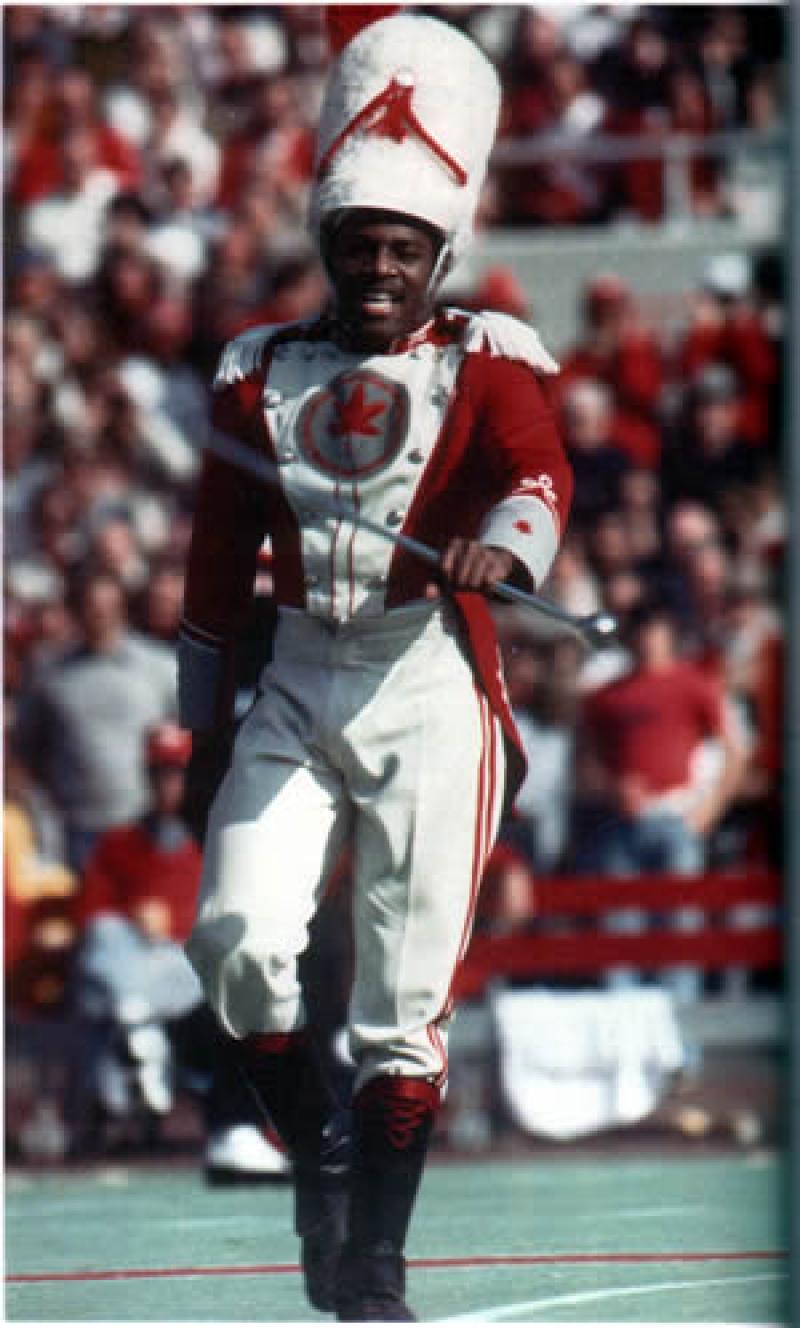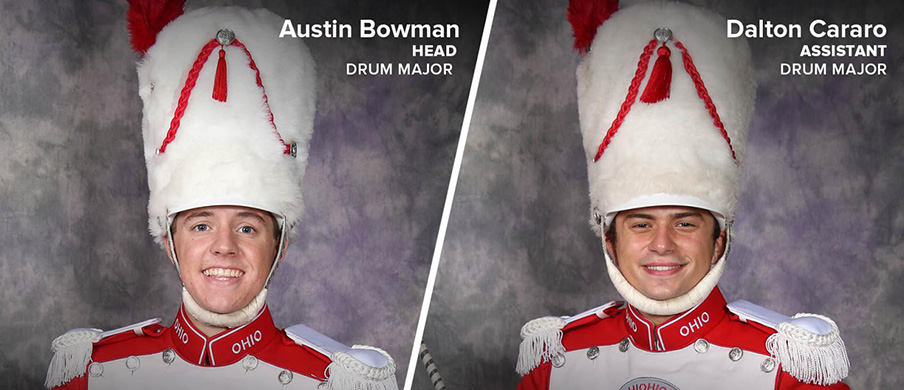Install the app
How to install the app on iOS
Follow along with the video below to see how to install our site as a web app on your home screen.

Note: This feature currently requires accessing the site using the built-in Safari browser.
-
New here? Register here now for access to all the forums, download game torrents, private messages, polls, Sportsbook, etc. Plus, stay connected and follow BP on Instagram @buckeyeplanet and Facebook.
You are using an out of date browser. It may not display this or other websites correctly.
You should upgrade or use an alternative browser.
You should upgrade or use an alternative browser.
The Ohio State University Marching Band (TBDBITL)
- Thread starter buckeyefool
- Start date
ScriptOhio
Everybody is somebody else's weirdo.
3. DOTTING THE I — OHIO STATE

Oct 28, 2017; Columbus, OH, USA; Ohio State Buckeyes band member dots the \"i\" before the game against the Penn State Nittany Lions at Ohio Stadium.
The Ohio State band is one of the more iconic marching bands in the entire country and their pregame traditions are among the best of them out there. Among those traditions is the dotting of the I by the band. In the pregame, the band spells out, “Ohio,” in script letters and the drum major then becomes the dot on the letter I. It is a big honor for those in the band and something that Ohio State fans love to watch unfold in front of them.
Upvote
0
ScriptOhio
Everybody is somebody else's weirdo.
HOW!?
I wondered the same thing when I saw Dwight Hudson do it back in the 70s (at 1:46):
Dwight Hudson: 1977-1979

In 1975, when he was a junior in high school, he was introduced to a prominent baton instructor, Mrs. Dee Felz of Columbus, Ohio, a former head majorette from Northwestern University (1956). Mrs. Felz gave Hudson the necessary technical training and the confidence to make him a champion. He was well rehearsed and gave numerous performances, competing in events which enriched his experience. In his last years high school Hudson was a well-known star, a veteran of many band contests, parades and shows around central Ohio.
Additional help and encouragement from drum majors Ohio State did not come until his senior year in high school. The OSU band was aware of his talents, but so were other universities; Michigan, Northwestern, University of Southern California, and many Ohio colleges offered scholarships plus “extras" if he would enroll with them. Ohio State offered him nothing . . . nothing but the finest band with the best reputation for drum majors in the country.
Hudson's father, an employee at The Ohio State University, had for many years taken him to OSUMB rehearsals. Here he had acquired aspirations to lead the band. His personal letter written to the band director when he was in the fifth grade clearly states his intentions. Perhaps the reason that Hudson came to Ohio State was that he wanted to honor his dying mother's wish. She had hoped that some day he might lead the band at Ohio State.
The accomplishments of Hudson are many. For three years he served the band with distinction. He was voted the Most Inspirational Bandsman of the OSUMB in 1978. His showmanship and baton tricks surpassed description. If one were to single out a small fraction of his greatness, it would have been his timing. He had the ability to think ahead in music as much as two measures, throw the baton high in the air, execute one of his gymnastic movements, and recover the stick on the last musical note, winding up with a fantastic gesture and facial expression that told it all.
Because of his extreme popularity, Dr. Droste allowed Hudson to return for a third and final year in 1979, breaking the unwritten two-year rule. At the same time, Droste created the drum major squad, a group of prospective drum majors who trained during fall quarter.
Hudson received many standing ovations during his tenure as drum major. However, none surpassed the tremendous ovation he received following his farewell performance in 1979.
Entire bio: https://tbdbitl.osu.edu/marching-band/drum-major/biographies/hudson-1977
Upvote
0
ScriptOhio
Everybody is somebody else's weirdo.
FOR THOSE ABOUT TO MARCH, WE SALUTE YOU
For the first time in three years, Ohio State held public drum major tryouts at Lincoln Tower Field with junior Austin Bowman and senior Dalton Cararo selected to lead The Ohio State University Marching Band once again in 2022-23.
Bowman, a junior, returns as head drum major, while Cararo, a senior from Gahanna, was selected to serve a second year as assistant drum major.

Fun Gahanna fact: Dalton is the fourth drum major from the Columbus suburb in the last 30 years, joining head drum majors Brian Berendts (1992-93), Karl Neudorfer (1994-95), and Konner Barr (2018-19).
Entire article: https://www.elevenwarriors.com/the-...r-return-fox-sports-osu-drum-majors-announced

For the first time in three years, Ohio State held public drum major tryouts at Lincoln Tower Field with junior Austin Bowman and senior Dalton Cararo selected to lead The Ohio State University Marching Band once again in 2022-23.
Bowman, a junior, returns as head drum major, while Cararo, a senior from Gahanna, was selected to serve a second year as assistant drum major.

Fun Gahanna fact: Dalton is the fourth drum major from the Columbus suburb in the last 30 years, joining head drum majors Brian Berendts (1992-93), Karl Neudorfer (1994-95), and Konner Barr (2018-19).
Entire article: https://www.elevenwarriors.com/the-...r-return-fox-sports-osu-drum-majors-announced

Upvote
0
ScriptOhio
Everybody is somebody else's weirdo.
NATIONAL RECOGNITION FOR TBDBITL. ESPN approached the Ohio State marching band to have one of its members participate in a season-long college football commercial that will air on the network this fall. TBDBITL sent sousaphone player Avery Voress as its representative.
Voress, who will dot the “i” in Script Ohio when the Buckeyes face Michigan on Nov. 26, said he felt honored to act on behalf of Ohio State and the marching band in the commercial.
“It was an amazing opportunity to represent TBDBITL on a national level,” Voress said. “I am so happy to have gotten this experience, and I am beyond excited for this 2022 season. See you at the top of the ‘i’!”
The commercial promotes ESPN’s college football coverage for this fall. Former Ohio State quarterback Kirk Herbstreit presents in a lecture hall to Voress and a crowd of mascots, cheerleaders, band students and fans from across the country.
Voress even sat next to a pair of Michigan cheerleaders during filming. However, this clip of them didn’t make it into the final cut of the commercial:
Entire article: https://www.elevenwarriors.com/skul...-fields-lights-up-browns-in-nfl-preseason-and
Voress, who will dot the “i” in Script Ohio when the Buckeyes face Michigan on Nov. 26, said he felt honored to act on behalf of Ohio State and the marching band in the commercial.
“It was an amazing opportunity to represent TBDBITL on a national level,” Voress said. “I am so happy to have gotten this experience, and I am beyond excited for this 2022 season. See you at the top of the ‘i’!”
The commercial promotes ESPN’s college football coverage for this fall. Former Ohio State quarterback Kirk Herbstreit presents in a lecture hall to Voress and a crowd of mascots, cheerleaders, band students and fans from across the country.
Voress even sat next to a pair of Michigan cheerleaders during filming. However, this clip of them didn’t make it into the final cut of the commercial:
Entire article: https://www.elevenwarriors.com/skul...-fields-lights-up-browns-in-nfl-preseason-and
Upvote
0
ScriptOhio
Everybody is somebody else's weirdo.
The drone show was even more impressive in person. The video was only a portion of it and doesn't show the drone's light color changes.
Last edited:
Upvote
0
Outsiders just will never get to understand how special the band and these performances are unless they get to experience it all in person, and then it will only scratch the surface.
Upvote
0
ScriptOhio
Everybody is somebody else's weirdo.
Excellent halftime show, not as good as the "drone halftime show" vs Notre Dame; however, still an excellent show.
Last edited:
Upvote
0



